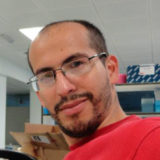
In 2011 Juan Manuel worked in Cardiff University for one month on conservation biology and genetics research under the supervision of Professor Mike Bruford. This work was a follow-up to a 2006 Darwin Initiative project on the conservation of the Andean guanaco. He worked in non-invasive genetic characterization, using DNA profiling and statistical methods to evaluated genotype error and consistency rate. Since then he kept contact with professor Bruford who introduced him to Benoît Goossens, it is because both of them that he finally got the opportunity to start his PhD and go to DGFC for field work.
When Juan Manuel was young he was fascinated by everything related with nature, his father, brothers and himself used to go for long walks into the woods, and he loved it. This experiences led to the decision to study Biology at San Marcos University, the most prestigious in Peru. In time, he came to understand how beautiful and complex species are, but at the same time the potential risk of these species to disappearing forever. Since then, his studies have focused on molecular biology and conservation. Doing his Master at Universidad Complutense de Madrid, Juan Manuel ratified the important role of people in the conservation of nature, we have the tools to control an even revert the damage we have already made, we can design conservation programs, estimate conservation status of a population, and we can carry out the sustainable management of a resource or a particular species.
Managing the negative effects of anthropogenic habitat loss, fragmentation and degradation on global biodiversity levels remains one of the major challenges of our time. This challenge is especially severe in tropical ecosystems, where our knowledge of the biodiversity that is being lost is poor and where the scale and rate of anthropogenic land conversion is unprecedented. At the present time, a major factor driving land conversion is biofuel agriculture, and in South East Asia especially, palm oil production. The negative impacts of palm oil agriculture in areas of high biodiversity have been clearly highlighted yet it seems reasonable to suppose that palm oil agriculture will not diminish in the near future and is instead set to continue its expansion into forested areas. If this is the case, then substantial new knowledge needs to be gained on the influence and impact on biodiversity that palm oil agriculture exerts, so that its negative effects can be mitigated against, in line with other agri-ecosystem research efforts that have become established in recent years.
Through his PhD project, Juan Manuel expects to gain a better understanding of how palm oil agriculture affects species and genetic diversity in an understudied group of vertebrates like the anura.
Education:
MSc Biology and Conservation awarded by Complutense de Madrid University, Spain.
Other affiliations: IUCN, National Geographic.
